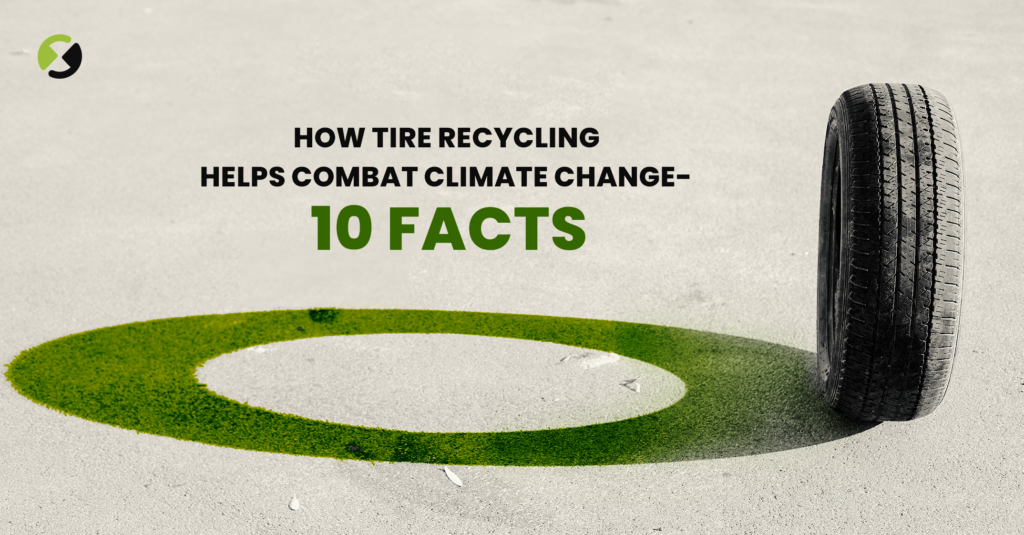
 Tires. They get us from point A to point B, but what happens when they reach the end of their life journey? Surprisingly, these rubber giants can play a crucial role in combating climate change.
Tires. They get us from point A to point B, but what happens when they reach the end of their life journey? Surprisingly, these rubber giants can play a crucial role in combating climate change.
So, the next time you plan to replace your car’s worn-out rubber, don’t toss those old tires, rather consider recycling them. Not only is it good for the environment, but used tires can be repurposed into creative items like planters for your garden. If you’re unsure how to recycle your tires, most local tire retailers accept them, or you can contact your city’s waste management department for guidance.
Let’s dive into the facts.
The Tire Problem: A Growing Concern
Before we explore the solutions, it’s important to understand the scale of the issue. Every year, millions of tires are discarded worldwide. These tires end up in landfills, taking up valuable space and releasing harmful chemicals into the environment. But it doesn’t have to be this way always.
Tire Recycling: A Circular Solution to Combat Climate Changes
Tire recycling is a great way to transform waste into valuable resources. Here’s how it helps combat climate change:
Reducing Greenhouse Gas Emissions
Tire recycling helps cut down greenhouse gas emissions, a major contributor to climate change. When tires are left to decompose in landfills, they emit methane, a potent greenhouse gas. Recycling tires, however, avoids this problem and reduces the carbon footprint. According to the Environmental Protection Agency (EPA), tire-derived fuel (TDF) can reduce CO2 emissions by up to 20% compared to coal.
Conserving Natural Resources
The production of new tires requires large quantities of natural resources, including rubber, oil, and metals. Recycling tires allows these materials to be reused, conserving resources and reducing the environmental impact of extracting and processing raw materials. For example, it takes approximately 7 gallons of oil to produce one new tire, but recycling a tire significantly reduces the need for new oil extraction.
Minimizing Landfill Waste
Tires are difficult to dispose of due to their durability. They take up significant space in landfills and can take hundreds of years to decompose. Recycling tires helps minimize this waste, preventing them from accumulating in landfills and reducing the environmental burden. Tire recycling has diverted more than 110 million tires from landfills annually.
Preventing Environmental Pollution
When tires are improperly disposed of, they can leach harmful chemicals into the soil and water, contributing to environmental pollution. Recycling tires helps prevent this contamination, protecting ecosystems and ensuring cleaner air, water, and soil. Research indicates that tire recycling can reduce leaching pollutants by up to 80%, making it a safer alternative for the environment.
Reducing Energy Consumption
Manufacturing new tires is energy-intensive, consuming substantial amounts of fossil fuels. Tire recycling, on the other hand, requires significantly less energy. Studies show that producing recycled rubber consumes 50% less energy than creating new rubber from raw materials, contributing to overall energy savings and reducing the reliance on non-renewable energy sources.
Supporting Sustainable Construction
Recycled tires are increasingly used in sustainable construction practices. Crumb rubber, a byproduct of tire recycling, is utilized in road construction, playground surfaces, and sports fields. This not only provides a second life for old tires but also reduces the demand for virgin materials in construction, further lowering environmental impacts.
Decreasing Air Pollution
Burning tires in open spaces releases toxic chemicals and particulate matter into the air, contributing to air pollution and respiratory problems. Tire recycling eliminates the need for such harmful practices, ensuring cleaner air and a healthier environment. By recycling, we can reduce tire-burning incidents, which are known to emit up to 16 times more pollution than burning coal.
Creating Green Jobs
The tire recycling industry is a growing sector, creating jobs and contributing to the green economy. By promoting tire recycling, we can continue to build a more sustainable economy that prioritizes environmental responsibility and provides employment opportunities.
Promoting Circular Economy
Tire recycling is a prime example of the circular economy in action, where products are reused, remanufactured, and recycled rather than discarded. This approach reduces waste, promotes sustainability, and helps combat climate change by keeping materials in use for longer. The global tire recycling market is expected to grow at a CAGR of 3.4% from 2021 to 2026, reflecting the increasing emphasis on circular practices.
Raising Environmental Awareness
Finally, tire recycling helps raise awareness about the importance of sustainable waste management and environmental conservation. As consumers become more conscious of the environmental impact of their choices, recycling programs can inspire broader participation in eco-friendly practices, driving collective action against climate change.
Let’s Make a Difference
Tire recycling is a powerful tool in the fight against climate change. By supporting recycling initiatives and choosing products made from recycled tires, we can contribute to a cleaner, healthier planet.
Wrapping Up
Tire recycling is a vital strategy in the fight against climate change. By reducing greenhouse gas emissions, conserving resources, and preventing pollution, tire recycling offers a practical solution to some of the most pressing environmental challenges. As the global community continues to prioritize sustainability, tire recycling will play an increasingly important role in building a greener, more resilient future for all.
Promoting and investing in tire recycling initiatives is not just about managing waste; it’s about taking a proactive stance in the global effort to mitigate climate change and preserve our earth for future generations.

